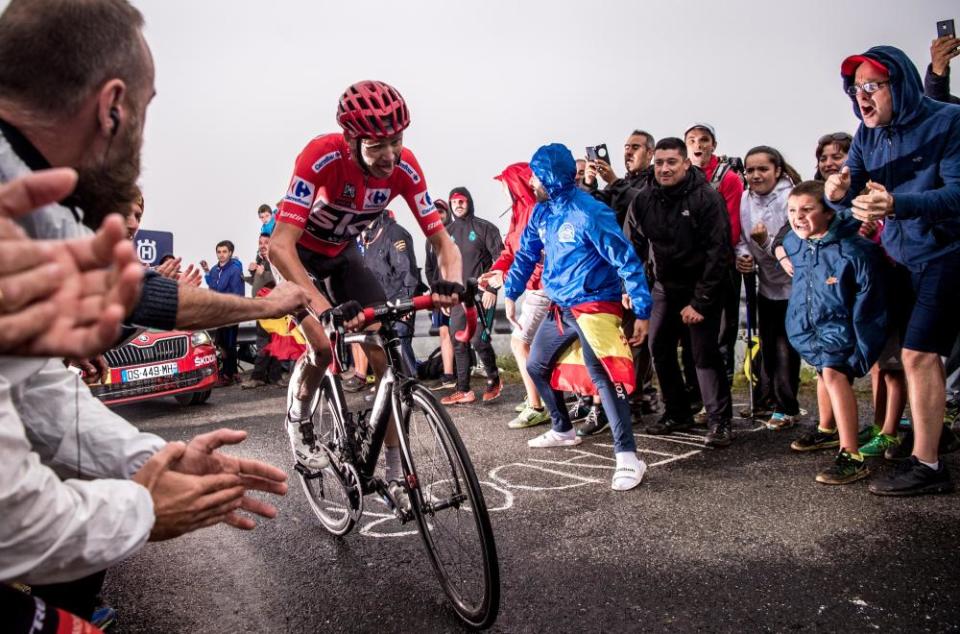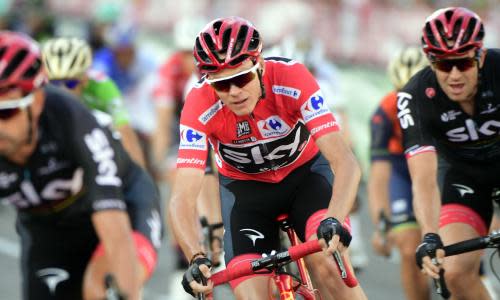Chris Froome fights to save career after failed drugs test result
Britain’s most successful road cyclist Chris Froome is fighting to salvage his reputation after a failed drugs test during his victory in the Vuelta a España in September.
Following a joint investigation by the Guardian and Le Monde, which revealed that the 32-year-old had double the permitted levels of the asthma medication salbutamol in his body, the four-time Tour de France winner admitted that he had upped his dose of the drug during the race – but insisted he had not broken any rules.
However, unless Froome can provide a sufficient explanation for the abnormal finding, or challenge the result, he is likely to be stripped of his Vuelta title by cycling’s governing body, the UCI, and could be given a ban from the sport of up to 12 months.
Given that Team Sky also operates a zero-tolerance policy when it comes to failed tests, Froome’s future role in the team may also come under consideration.
READ MORE: Hoggard urges Root’s men to smarten up
READ MORE: Socceroos refuse to confirm of deny Scolari rumours
READ MORE: Eden Hazard refuses man of the match award
The Guardian understands that Froome and Team Sky have recruited a team of medical and legal experts to seek an explanation of the findings. In particular, they are examining whether Froome was dehydrated at the time, or whether there were other physiological factors that may have led to the failed test.
One of the possibilities that will be offered to Froome is for a simulated test where he takes salbutamol and has his urine regularly assessed. However, informed sources expect the case to drag on for several more months – meaning Froome could still be under a cloud when he begins his season next spring.
It is certainly a far cry from the elation Froome was feeling in September, when he spoke of his joy after becoming the first Briton to win the Vuelta, which also made him the first cyclist to claim the Tour de France/Vuelta double in the same year since 1978.
Later in September he also won a bronze medal in the world time trial championships in Norway – a result he described as “an amazing end to an unforgettable season”. That period of sustained success led to him being nominated for this Sunday’s BBC Sport’s Personality of the Year award, where he was one of the leading contenders behind the boxer Anthony Joshua. But by then he had already failed a drug test, the result of which threatens to damage his reputation as one of Britain’s most successful athletes.
That success had arrived late in Froome’s career. Until his mid-20s, his results were those of an average member of the peloton. However, the softly-spoken rider, who was born in Kenya but represents Britain, shot to prominence in 2011 with a second-place finish in the Vuelta. He explained his improvement had come about owing to the successful treatment of the parasitic flatworm bilharzia, which had robbed him of energy.
The following year he won an Olympic bronze medal in London before securing his first Tour de France title in 2013. Such has been his dominance since, he now enjoys a £4m-a-year salary from Team Sky – making him the best-paid rider in the world. Yet he has never experienced the same affection that another home rider, Sir Bradley Wiggins, has enjoyed with the British public. Perhaps that has something to do with him having never lived in England, having grown up in Kenya and South Africa and then lived in Monaco for many years.
Inevitably, given cycling’s troubled past with doping, Froome has also faced questions over whether he is clean, despite having never returned an abnormal drug test result before now. Such has been the vitriol at times that at the 2015 Tour de France one fan spat at him while another threw a bottle of urine in his face. The way he carried himself at the time earned him plenty of admirers and Froome has always vehemently insisted he is no cheat.

Pointedly, when the Russian hackers Fancy Bears published documents showing that Wiggins had been granted therapeutic use exemptions for the powerful corticosteroid triamcinolone before three major races for a pollen allergy, Froome suggested his former colleague had been wrong. As he put it on his personal Twitter account last year, he was not prepared to “win at all costs”, adding “there are some athletes who not only abide by the rules that are in place, but also those of fair play”.
Now, however, the spotlight is on him. Under World Anti-Doping Agency rules, riders are allowed a level of 1,000 nanograms per millilitre. However, Froome was found to have twice that amount in a urine sample taken during the Tour of Spain on 7 September.
In a statement on Wednesday, he insisted that he had operated within the rules. “It is well known that I have asthma and I know exactly what the rules are,” he said. “I use an inhaler to manage my symptoms (always within the permissible limits) and I know for sure that I will be tested every day I wear the race leader’s jersey.
“My asthma got worse at the Vuelta so I followed the team doctor’s advice to increase my salbutamol dosage. As always, I took the greatest care to ensure that I did not use more than the permissible dose. I take my leadership position in my sport very seriously. The UCI is absolutely right to examine test results and, together with the team, I will provide whatever information it requires.”
If the test result is upheld Froome could face a significant ban, which may rule him out of next year’s Giro d’Italia and the Tour de France, where he was planning to go for a record-equalling fifth yellow jersey. In 2007 the Italian cyclist Alessandro Petacchi was given a 12-month ban for excessive salbutamol and stripped of his five stage victories in the Giro d’Italia.
Tweeting on Wednesday, Froome added: “Thank you for all the messages of support this morning. I am confident that we will get to the bottom of this. Unfortunately I can’t share any more information than I already have until the enquiry is complete.”
The test result is another blow for the credibility of Team Sky, who have struggled to recover their reputation after an anti-doping investigation was launched into allegations about a package delivered to Wiggins at a race in 2011.
The UK Anti-Doping Agency closed its 14-month investigation in November after being unable to find sufficient evidence of wrongdoing. However, a second investigation by the digital, culture, media and sport select committee continues.
Wiggins has always insisted that he is innocent and last month said his life was being made “a living hell” because of a “malicious witch-hunt” against him over the contents of the package.
In a statement Team Sky said Froome received the notification of the adverse analytical finding from the UCI on 20 September, prior to the individual time trial event at the world championships. The team principal, Sir Dave Brailsford, said: “There are complex medical and physiological issues which affect the metabolism and excretion of salbutamol. We’re committed to establishing the facts and understanding exactly what happened on this occasion. I have the utmost confidence that Chris followed the medical guidance in managing his asthma symptoms, staying within the permissible dose for salbutamol. Of course, we will do whatever we can to help address these questions.”
However the fact that Froome is battling to clear his name will only further ramp up the pressure on his beleaguered team – especially as it was built on the foundations of having a zero-tolerance drug policy.
• Sign up to our weekly email, The Recap, here, showcasing a selection of our sport features from the past seven days.

 Yahoo Sport
Yahoo Sport 






































